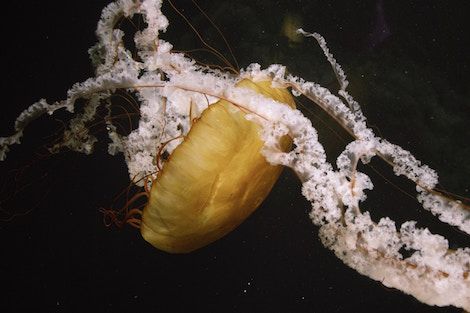
This New Book Is Made from (Synthetic) Jellyfish
I have an irrational fear of jellyfish. Scientifically-minded folks tell me that the real name for my fear is scyphophobia, presumably from the Greek word for squishy monster.* If they ever say anything more about jellyfish, I never hear them over the sound of my screaming.
I had thought that my life was mostly insulated from these tiny (and not so tiny) stinging trash bags.** I work in publishing. I spend my days surrounded by books.
It turns out that nowhere is safe. Jellyfish have found their way inside of the publishing house. Companies are now making books out of them.
Saying the books are made out of jellyfish is, perhaps, melodramatic. The creatures that stalk me from the sea are only tangentially related to the process. However, Paul Shapiro’s book Clean Meat was indeed bound with lab-grown jellyfish collagen. Geltor, the company that created the cover, engineered the cover to be an environmentally friendly alternative to binding books in leather. Despite the cover’s origins, Shapiro told the San Francisco Chronicle that Clean Meat “looks and smells just like a leather-bound book.” Using synthetic jellyfish collagen is a perfect fit for Clean Meat. The book is about the different companies who are working to transform lab-created animal cells into meat. It may someday be the case that the ground bison meat sold in supermarkets never came from a living animal.
Shapiro and Geltor recently sold the first of these jellyfish books on eBay for $12,790. Proceeds from the sale go to the Good Food Institute, which, in a thematically appropriate move, is a nonprofit that promotes cultured meat.
Though fascinating, all of this leaves my lizard brain with a conundrum. I love books but hate jellyfish. Can I stand to hold a book made out of one?
Hopefully, yes. It sounds like the only sting in these books comes from words. I should be safe.
*Actually from the Greek word skyphos, a type of cup or goblet
** Yes, yes. I know jellyfish can be lovely and play vital roles in their ecosystems. Remember: phobia. Irrational.













